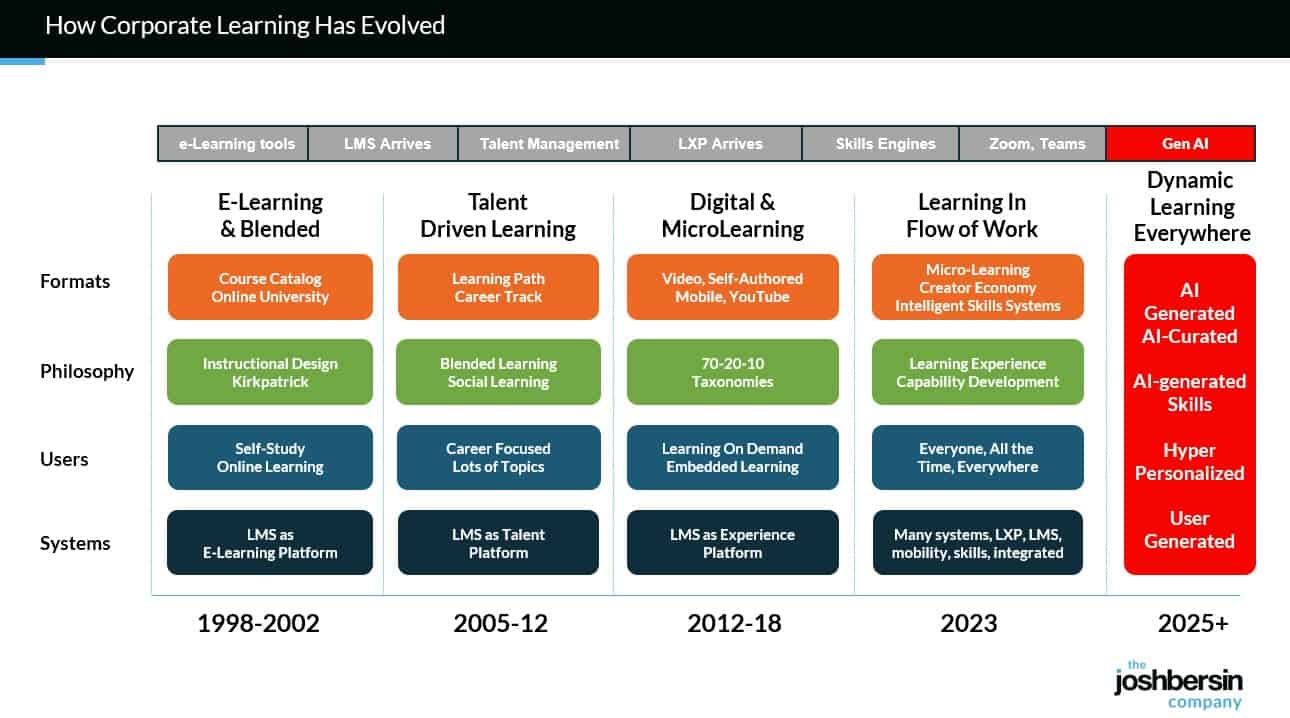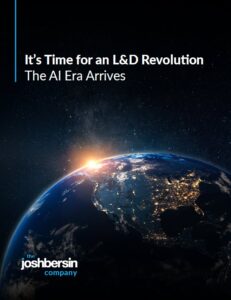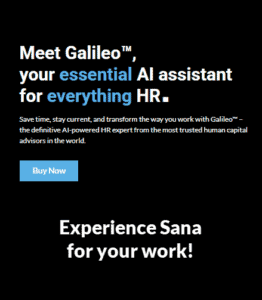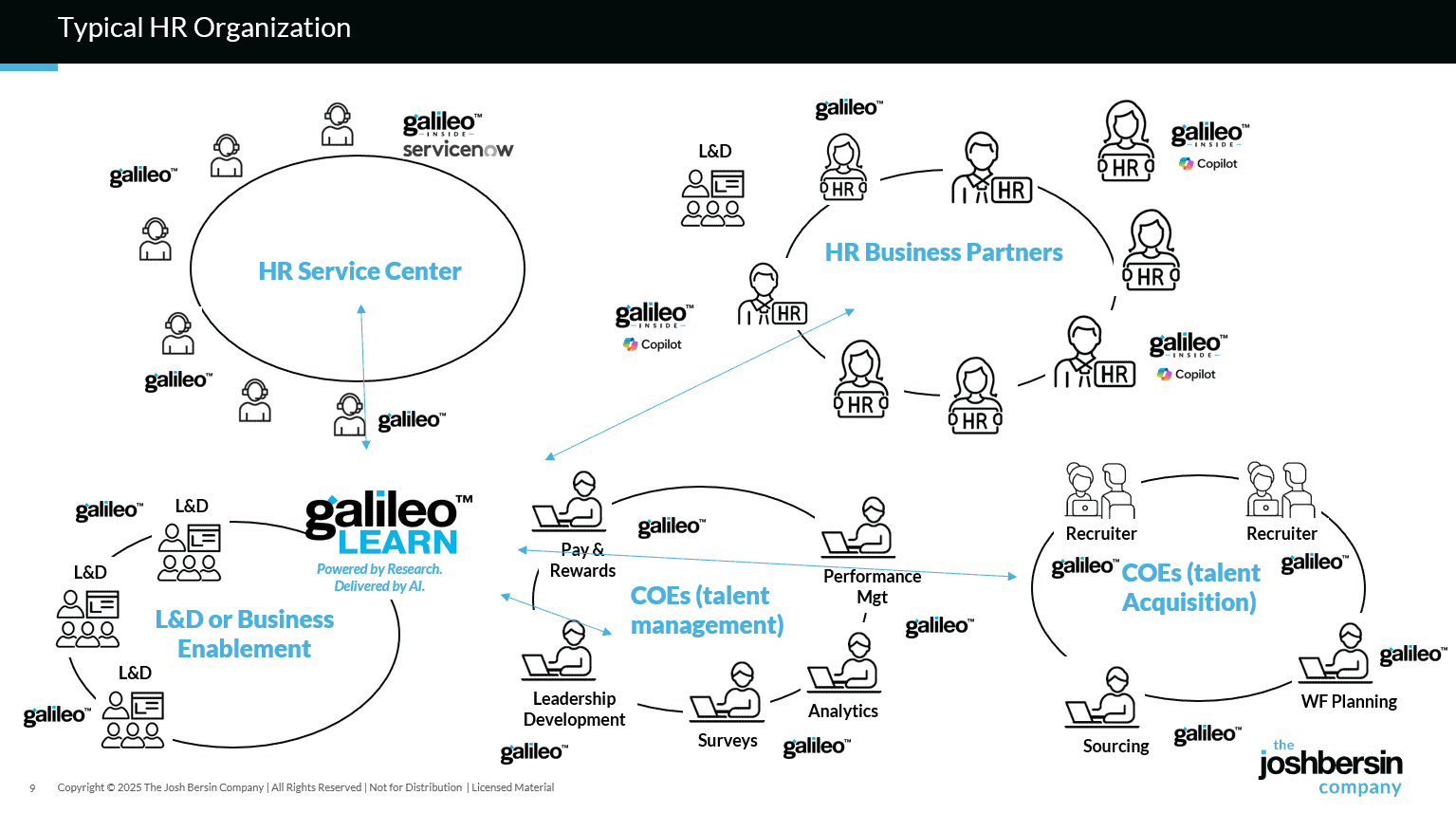Today, only a few weeks after acquiring Paradox and Flowise, Workday announced the acquisition of another AI company: Sana Labs (for $1.1 billion).
Sana, the company that we partner with for Galileo and Galileo Learn, is a pioneering AI-native platform designed for learning, knowledge management, and agentic applications. The Sana Agent and Sana Learning platforms give Workday a badly-needed upgrade to its learning solution, and also give the company a complete agent platform, which Workday now calls “a new front-door to work.”
There are two big moves going on here.
First, the Workday Learning platform has been challenged for years. It was originally designed as a video sharing system, not as an LMS. (The company acquired Mediacore in 2015 with a vision to build video-based learning to the enterprise). It seemed like a brilliant idea at the time, but video distribution is a “feature” not an “architecture,” so during the last 9 years Workday has been building Learning into a robust, open, LMS.
(In its early days Workday Learning didn’t even have a way to import third party content.)
Much has been fixed, but over the years Workday Learning customers have had to be patient.
Well now, as the corporate learning market shifts to AI, (read the details in our study “The Revolution in Corporate Learning” ), Workday can jump ahead. This is because the $400 billion corporate training market is moving quickly to an AI-Native dynamic content approach (witness OpenAI’s launch of in-line learning in its chatbot). We’re just finishing a year-long study of this space and our detailed report and maturity model will be out in Q4.
 |
With Sana, and a few other AI-native vendors (Uplimit, Arist, Disperz, Docebo), companies can upload audios, videos, documents, and even interviews with experts and the system build learning programs in minutes. We use Sana for Galileo Learn (our AI-powered learning academy for Leadership and HR), and we now have 750+ courses and can build new programs in days instead of months.
This is possible because Sana is an AI-native system: it generates courses, videos, interactivities, tutors, simulations, and assessments dynamically. As I discuss in my podcast on this topic, the traditional LMS does none of this – all those content objects had to be built separately.
 And there’s more; this type of system gives every employee a personalized, chat-based experience to learn. Our Galileo Agent has full access to our Galileo Learn content, so any time you want to ask a question you see learning options simply appear in your answer. If you don’t want to take a course, you can just ask questions and the system reads through the content and answers.
And there’s more; this type of system gives every employee a personalized, chat-based experience to learn. Our Galileo Agent has full access to our Galileo Learn content, so any time you want to ask a question you see learning options simply appear in your answer. If you don’t want to take a course, you can just ask questions and the system reads through the content and answers.
(You can get the entire Galileo Suite for $695 and experience Sana for your own professional use.)
A New Front Door to Workday (and Work)
Now to the second goal for the acquisition: to build a new Workday experience called “a new front door for work.”
Workday believes the Sana Agent, which we use for Galileo, can become a new user experience for Workday, coupled with Sana’s ability to:
- Find answers, information and files by instantly searching across a company’s most critical data sources, including Workday, Google Drive, SharePoint, and Office365,
- Act proactively by anticipating needs, summarizing insights, and assisting with projects,
- Create presentations, documents, and dashboards, even full learning courses, based on company knowledge,
- Automate repetitive tasks and routine work by executing workflows end-to-end.
It’s an exciting move, and it changes Workday as a company.
Let me explain.
Workday is well known as a system that isn’t easy to use. It’s filled with thousands of features, built on an architecture designed around 2006. It uses a highly secure workflow engine, and its database is proprietary (recently opened to APIs and a new feature called The Workday Data Cloud.)
Rather than wait for competitors to build agents which replace parts of Workday, the company intends to use Sana as a “front door” to access Workday and virtually any other corporate system. And because Sana is an Agent, you have the power of your favorite LLM to analyze information directly.
(In Galileo, for example, you can pull data from Lightcast, access your company’s compensation and job data, and benchmark jobs and skills, analyzing to your heart’s desire. Read our 100 use-cases for Galileo in HR for more detail.)
Other cloud vendors are moving in this direction, with SAP perhaps the most bold. SAP Joule, ADP Assist, ServiceNow’s NowAssist, and new agents from UKG, Oracle, and other enterprise players are designed to make these systems easy to use and serve as a platform to build applications. The old Workday Assistant was never designed for this, so Sana plays a major role in Workday’s strategy.
The problem is that this runs head-first into offerings like the Microsoft Copilot, Gemini, ChatGPT, Anthropic, and every other agent provider in the market. Sana, which we know well, lets the user select which LLM to use. But corporations don’t want a proliferations of “front doors,” so Workday (and Sana) are going to have to fight this new war. (Workday Build is the company’s new low-code developer toolset.)
In some ways Workday has no choice. Without this kind of approach Workday becomes a “service” behind other vendors’ agents.
 As we’ve sold and implemented Galileo we’ve seen how this plays out. People love Galileo for all that it does (massive amounts of HR, talent, and management intelligence), and they want the platform to pull data from Workday and other sources. But IT people push back, and want to make sure Galileo (Sana) can interoperate with what they have.
As we’ve sold and implemented Galileo we’ve seen how this plays out. People love Galileo for all that it does (massive amounts of HR, talent, and management intelligence), and they want the platform to pull data from Workday and other sources. But IT people push back, and want to make sure Galileo (Sana) can interoperate with what they have.
In our case we’re building integrations with ServiceNow, SAP, and Microsoft. For Workday, such integrations become core to their strategy.
And I must say the “agent first” paradigm is coming fast.
This week OpenAI shared new research which shows that 49% of ChatGPT’s 800 million users are “asking for information” and 40% are “generating new content.” So already more than 10% of Google’s direct web-based traffic has disappeared. Soon we will all have our own personal AI agents, managing our work lives and accessing our internal systems.
OpenAI, Apple, and Meta see this coming. These personal AI agents will operate in our phones, our PCs, our glasses, and even our clothes. Workday wants to play in this game (note Sana has a mobile app and you can speak to it).
This week we’re launching a feature in Galileo which lets users not only access our massive intelligence corpus about HR and management, but also search the web. And through Sana, Galileo users can choose to use any OpenAI model, Anthropic’s Claude, and direct search.
The tricky part is convincing IT departments to buy in, and this is something Workday has done in the past.
Many IT departments are already standardized on MS Copilot, OpenAI, Gemini, or an internally developed agent. Tools like Joule (SAP), Glean, and other specialized agents litter the landscape. (Look at how many agents there are for marketing, sales, video creation, meeting recordings, and other informational purposes.) Workday (Sana) will have to integrate, cooperate, or compete with these tools.
Competitors Loom
On the Agent side, Microsoft, Google, OpenAI, SAP, and ServiceNow offer agent platforms and developer tools. While Workday introduced its Build offering to help people develop apps easier, companies like Microsoft, Google, and Atlassian, have advanced agent development tools as well.
On the learning side, where Sana leads the market, competition is heating up. Other learning vendors (Cornerstone, Degreed, Arist, LinkedIn, Docebo, Uplimit, and OpenAI itself) are building dynamic content systems and I wouldn’t be surprised to see Anthropic, Google, and Microsoft jump in.
Note that OpenAI’s Jobs Initiative includes the launch of AI training within ChatGPT, and look at what Google’s NotebookLM can already do. We talked with a client last week that uses NotebookLM for product training.
Sana, however, is ready for this battle. It’s elegant, well designed, and open.
Sana offers a refined and fast agent platform, an advanced learning system, integrations to other applications, and amazing knowledge management. As we’ve promoted to our clients, Sana (Galileo in our case) is a platform that helps every HR professional (and manager) learn, automate, and scale.
 |
A New Direction for Workday
The Sana strategy changes the direction for Workday. Rather than thinking of Workday as “ERP in the back office,” Workday becomes a front-door for work.
And in the meantime, Workday customers get one of the most exciting learning platforms in the market.
It’s a very strategic deal, and we are thrilled to see our friends at Sana flourish and grow. We’ll stay close in touch and share more as time goes on.
(For more explanation, view my video “The Galileo Strategy” where I explain the Sana architecture in the Galileo and HR context.)
Additional Information
Experience Sana designed for HR and Managers: Get Galileo!
The Revolution In Corporate Learning: Our Research Study
New Research: The Talent Acquisition Revolution
Workday to Acquire Paradox. A Bigger Deal Than You Think.
Join our AI Excellence Study! We’ll share world-class findings in AI transformation.
Source link


